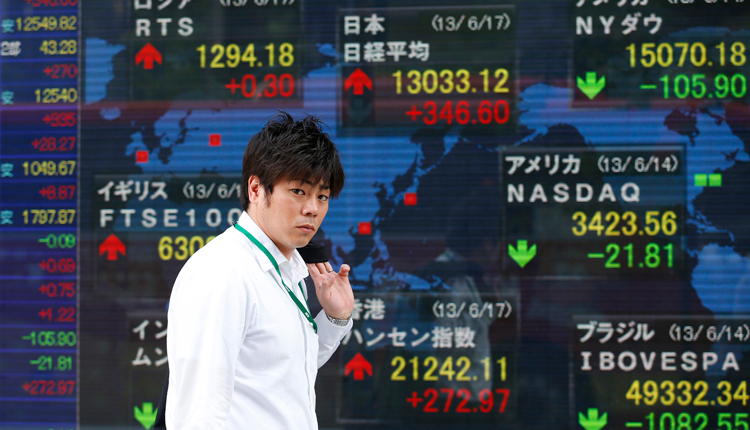Asian markets were largely subdued in Thursday morning trade, although Chinese stocks took a tumble.
Greater China markets deepened their losses by the morning, with the Shanghai Composite declining 0.63 percent, and the smaller Shenzhen Composite losing 0.68 percent. Stocks in most sectors fell, including financials, autos, oil and property. The Hang Seng Index lost as much as 0.74 percent.
Japan’s Nikkei 225 was slightly down by 0.08 percent. In South Korea, the benchmark Kospi was up by 0.61 percent, with the manufacturing, tech and oil sectors primarily contributing to the advance.
Meanwhile, Australia’s S&P/ASX 200 pared some losses in the morning to edge down by 0.02 percent. MSCI’s Asia Pacific excluding Japan index inched higher by 0.12 percent during the morning session.
American stocks closed sharply higher on Wednesday after U.S. President Donald Trump said Washington and the European Union had launched a “new phase” in their relationship, saying that the two major economies would start negotiations immediately on a number of areas that include working toward “zero tariffs” on industrial goods, and further cooperation on energy issues.
“We agreed today, first of all, to work together towards zero tariffs, zero non-tariff barriers and zero subsidies for the non-auto industrial goods,” Trump said at a joint press conference in the White House Rose Garden with European Commission President Jean-Claude Juncker.
Vishnu Varathan, head of economics and strategy at Mizuho Bank, said in a Thursday note that both the U.S. and European Union have started “essentially establishing a trans-Atlantic trade truce.”
“This welcome, but unexpected positive turn in global trade dynamics almost immediately unravels fears of trans-Atlantic trade war,” he wrote.
However, it is “way too early to conclude more convincingly on wider global (and China) negotiations,” Varathan said. “So, relief rallies will have to substitute for conviction buys for now.”
In fact, negotiations have a long way to go, Shane Oliver, head of investment strategy and chief economist at AMP Capital, said in a Thursday morning note.
“There was hope of a deal with China in May — with Trump initially crowing about a May 20 trade deal, but since then both China and the US have dug in with Trump tapping popular support for protectionism and anti-Chinese sentiment. So, the trade threat could get still worse before it gets better which means it risks taking the edge off economic growth,” he said.
The Dow Jones Industrial Average rose 172.16 points to close at 25,414.10, while the Nasdaq Composite jumped 1.2 percent to an all-time high of 7,932.24. The S&P 500 gained 0.9 percent to trade at 2,846.07, closing less than 1 percent from its record high.
After the bell, disappointing quarterly results from Facebook, however, led to a major decline in after-hour trade. Given that move, the company is on track to lose more than $125 billion in market value, and other tech stocks were set to fall in response.
In corporate news, South Korean chipmaker SK Hynix posted a record second-quarter profit on the back of strong server DRAM chips. Operating profit for the April through June quarter grew 83 percent to 5.6 trillion won ($5 billion) from 3.1 trillion won a year earlier. The company’s shares were up 2.73 percent at 12:17 p.m. HK/SIN.
Elsewhere, Chinese online group discount company Pinduoduo priced its U.S. initial public offering at $19 per American depositary share, raising $1.63 billion in the second-biggest U.S. float by a Chinese firm this year, according to a Reuters report, citing sources.
Meanwhile, the dollar index, which tracks the U.S. currency against a basket of peers, last stood at 94.151 at 10:02 a.m. HK/SIN. Against the yen, the dollar further weakened to trade at 110.81.
Source: CNBC


